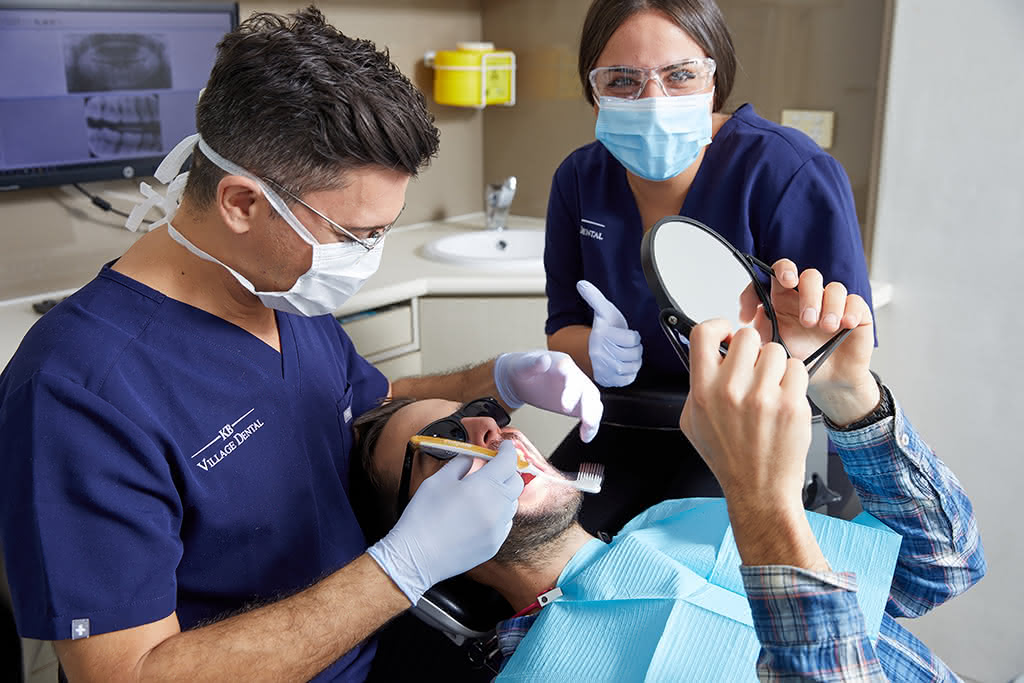Top Tips for Overcoming Dental Anxiety
If you’ve ever felt heightened and disabling fear, stress and anxiety when preparing for a dental appointment, you may have dental phobia. Dental anxiety is more common than you may think—it’s estimated by Harvard Health that 13 to 24% of people worldwide share this experience.
As a result, dental anxiety is sometimes diagnosed as ‘anticipatory anxiety’, according to PubMed Central, because it stems from a fear of both real and anticipated dangers. However, when this fear comes between necessary dental procedures and worsens your toothaches or infections, it’s important to have some coping strategies up your sleeve.
What is Dental Anxiety?
A general nervousness about medical treatment or examinations is a normal reaction. Dental anxiety is more severe and specific to dentistry, stemming from:
- A previous negative dental experience
- A feeling of helplessness or unease during dental procedures
- A fear of pain, and/or triggers such as needles or drills
- Previous head or neck trauma, or other traumatic experiences
- Trust issues
- Claustrophobia or the view that accessing the mouth is an invasion of personal space
If you have dental anxiety, you may start sweating, feeling nauseous and have an increased heart rate at the thought of visiting the dentist. If your anxiety becomes even more heightened, it may turn into an irrational fear (phobia) and you therefore completely avoid the dentist. People with dental phobias have a higher risk of dental problems like early tooth loss and damaged teeth.
Why Overcoming Dental Anxiety Matters
Dental anxiety is thus a vicious cycle, feeding the underlying causes of a fear of dental hygiene. Many dental diseases are lifestyle-related and therefore preventable. As a result, avoiding the dentist can worsen dental diseases, causing a greater need for emergency care or complex treatment in the future. You’ll also miss out on expert advice to better look after your oral health from the dentist.
During a regular dental check-up, your dentist will perform various examinations, including x-rays and cleanings to maintain your dental cleanliness and monitor for any early signs of dental disease. This could include ulcers, for example, which could raise concerns about mouth cancer, particularly important in those who smoke or regularly drink alcohol.

To minimise the seriousness of any dental procedure, practising healthy dental care at home is imperative. If you regularly consume sugary food and drinks, smoke and drink alcohol, take care of your teeth by brushing twice a day and flossing once a day. You may recognise that these lifestyle factors are similar to those that cause diabetes, obesity, heart disease, strokes and some cancers. So, changing some of these habits and looking after your body will not only make your smile shine brighter but help you to feel better about yourself too.
Top Tips for Overcoming Dental Anxiety
It’s our mission at KB Village Dental to keep you as comfortable as possible during your appointment. From our experience with anxious patients, we’ve collated a list of tips that truly help.
Communicate with Your Dentist
It’s best to let your dentist know as early as possible if you suffer from dental anxiety, or if anything makes you uncomfortable during the appointment. At KB Village Dental, our staff are highly trained in relaxation exercises and finding a treatment plan for both adults and children that suits all types of anxiety disorders.
It is important that your dentist knows how to communicate that is sensitive to your needs and to work out whether you want things explained before they do it, or as little explained, as everyone is different!. It is also important to establish from the outset that you have a sense of control, for example, raising a hand to signal that you’d like a break or a stop during the treatment.
Consider Sedation or Pain Management Options
Have a conversation with your dentist and/or doctor about the possibility of using relative analgesia during your appointment, like nitrous oxide, anxiety-relieving medication, conscious sedation or general anaesthesia. That way, the dentist can complete what needs to be done without your anxieties causing any possible interruptions.
Nitrous oxide and anxiety-relieving medication promote muscle relaxation, temporarily leaving you feeling calm, yet still conscious so you can respond to the dentist’s prompts. IV sedation and general anesthesia will leave you feeling drowsier for longer. Such sedation options would only be considered depending on the procedure and once the level of dental anxiety is understood.
Try Relaxation Techniques Before and During Visits
Alternatively, safe and actionable relaxation tips like deep breathing exercises, meditation, mindfulness, listening to music, watching television or playing with a stress ball can help you to chill before the appointment. All of these methods are a great first effort to relieve anxiety.
Guided imagery is also recommended; a relaxation technique useful to manage mental health where you lie still and imagine yourself in your favourite location. Progressive muscle relaxation—tensing and untensing various parts of your body—can help keep your mind at ease.
If you prefer some music to calm you down, ask your dentist to play some while your treatment is ongoing. Or if that’s not possible, bring some headphones. Your dentist won’t mind if you need a calming distraction if it means you or your child’s teeth can receive the proper care they need.
Bring a Friend or Family Member for Support
We always feel more comfortable and secure in ourselves and our surroundings when we are with someone we have a strong relationship with. If you’re feeling particularly anxious about your upcoming appointment, ask a person you trust to come along with you. They can provide reassurance and company to help calm your nerves.
Choose the Right Dentist
It’s a valid possibility that any bad experiences during dental appointments may be because the dentists weren’t the right fit to care for your physical and emotional needs.
You want to find a dentist who is trusted by anxious patients. Reading reviews or asking for recommendations from close friends and family can help you settle on the choice that’s right for you.

Start with a Consultation Appointment
At KB Village Dental, we welcome new patients to book an initial consultation, with no treatment, to build comfort with our staff. Our dentists can walk you through how we carry out check-ups, information about treatments and what’s expected of you (not much) before you come for your appointment.
You can also call ahead of time to inform us of your anxiety and ask questions about what to expect during your visit in preparation. That way, we can offer any counselling support and create a soothing environment, so your appointment goes as smoothly as possible.
Booking an early appointment time will help curb anxiety due to a reduced anticipation time. Try to add dental visits into your routine to not throw you off course.
Ultimately, we want you to be able to visualise a positive outcome before even walking through our doors. If there’s something our team can help with to ease your feelings of anxiety and symptoms, we want to know about it.
Let KB Village Ease Your Dental Anxiety
KB Village Dental is here to keep you smiling. Regardless of your age or anxiety condition, our team has worked with all types of needs and takes pride in our supporting and non-judgemental environment.
We offer a range of affordable dental services, including check-ups and ongoing treatments. So, take the first step in managing your dental anxiety and book a consultation or check-up today!

